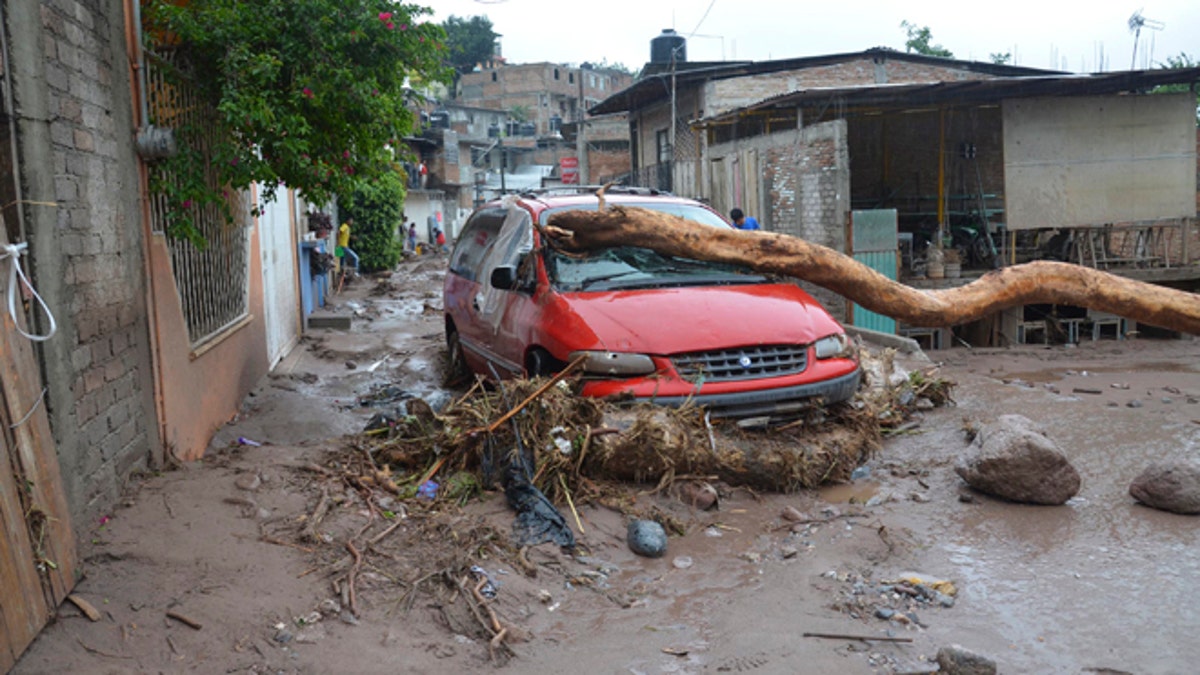
Sept. 16, 2013: A damaged vehicle stands in the middle of a road after a landslide caused by heavy rains came down on a low income neighborhood in the city of Chilpancingo, Mexico. (AP)
ACAPULCO, Mexico – Twin storms left scenes of havoc on both of Mexico's coasts on Tuesday, with tens of thousands of tourists stranded in the resort city of Acapulco on the Pacific and heavy damage reported along the Gulf coast.
The death toll from the combined punch of Hurricane Ingrid and Tropical Storm Manuel rose to 38 Tuesday, according to Mexico's federal Civil Protection coordinator, Luis Felipe Puente.
As many as 60,000 tourists, many of whom traveled from Mexico City for a long holiday weekend, found themselves stranded in Acapulco, with the airport flooded and highways blocked by landslides and water caused by Manuel. While many hotels were operating normally, many of the outlying neighborhoods of the city were without water or power service, and television images showed water knee-deep around the check-in counters of the city's airport.
Officials were struggling to open the highway and airport, and bring food and relief supplies into the resort city of more than 800,000.
"It has been very difficult, because all means of access have been cut off," Puente told the Televisa network.
Federal officials said that could take until at least Wednesday, and Acapulco's mayor said two of Mexico's largest airlines, Aeromexico and Interjet, would soon be running one flight each every hour from a military air base just outside the city.
Those with already purchased tickets were being given first priority, then families with small children or elderly members, officials said.
The Guerrero state government said 40,000 tourists were stuck in the city, while the head of the local chamber of business owners said reports from hotels indicated the number could be as high as 60,000.
Many emerged from their hotels for the first time Tuesday morning after days of pelting rain.
"We realized the extent of the disaster for the first time because we were closed in and only saw rain and flooding," said Alejandra Vadillo Martinez, a 24-year-old from Mexico City who was staying with seven relatives in the Crowne Plaza hotel overlooking the Bay of Acapulco.
The main coastal boulevard was navegable Tuesday morning and most hotels appeared to have power, water and food, though that was little consolation to tourists unable to get home.
"We've realized that it was a mistake to come to Acapulco because all we saw was rain, rain, rain," said Guadalupe Hernandez, a 55-year-old housewife from Mexico City.
The situation was far more serious on the low-income periphery of the city, where steep hills funnel rainwater into neighborhoods of cinderblock houses.
City officials said some 23,000 homes, mostly on Acapulco's outskirts, were without electricity and water. Stores were nearly emptied by residents who rushed to stock up on basics as the dimension of the storm damage became clear. An unknown number of homes were badly damaged by landslides and flooding.
Natividad Gallegos, who lives in a poor section of Acapulco, said she returned from shopping Monday to find house buried by a landslide from a neighboring hill.
"When I got home I saw a lot of strangers with picks and shovels, digging where my house used to be," she said, weeping.
She said she lost six members of her family in the landslide, including her two children.
Jorge Luis Ramos Ezcurdia, 45, said he drove to Acapulco from Mexico City for the three-day Independence Day weekend with nine other people and found himself still unable to leave Tuesday morning, when all were supposed to be back at work. Instead, he was stuck at the boutique hotel where he had spent the weekend.
Remnants of Manuel continued to drench Mexico further up the Pacific coast and the U.S. National Hurricane Center said there was a chance it could regain force near resorts at the tip of the Baja California Peninsula.
Mexico's Gulf Coast states meanwhile were trying to recover from Hurricane Ingrid, which drove tens of thousands of people from their homes and blocked highways. That storm was dissipating over northeastern Mexico on Tuesday.
The Mexican government said the country had not seen a similar weather crisis since 1958, when it was simultaneously hit by two tropical storms, also on separate coasts.
The governor of the Gulf Coast state of Veracruz announced that 12 people died when a landslide smashed into a bus traveling through the town of Altotonga, about 40 miles northwest of the state capital.
More than 23,000 people fled their homes in the state due to heavy rains spawned by Ingrid, and 9,000 went to emergency shelters. At least 20 highways and 12 bridges had been damaged, the state's civil protection authority said.







































